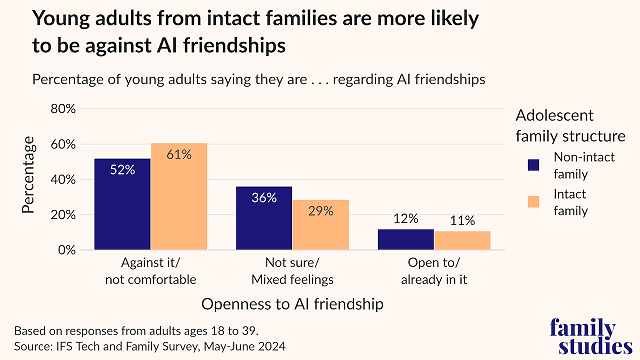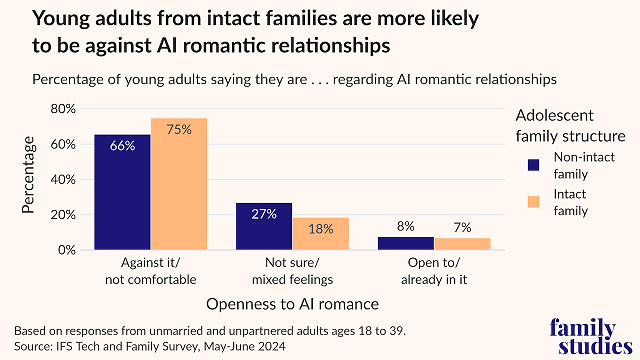Highlights
- Respondents from intact families are more likely (61%) to be against AI friendships than their counterparts (52%). Post This
- Relational and erotic AI is likely to encounter less disapproval from daily pornography users and those who come from non-intact households. Post This
- 75% of unmarried and unpartnered young adults from intact families say they are against or uncomfortable with AI romantic relationships, vs. 66% of those from non-intact families. Post This
Artificial Intelligence has quickly become popular among younger generations, with Gen Zers and Millennials being the most active users of generative AI. As we noted in our November 2024 research brief, “Artificial Intelligence and Relationships,” this openness to AI among Gen Z and Millennial young adults extends in many cases to romance and friendship. The Institute for Family Studies/YouGov survey of 2,000 adults under age 40 found that 1 in 4 young adults believe that AI has the potential to replace real-life romantic relationships. It also found that the young adults most open to AI romantic relationships and friendships are daily porn users.1
Our new analysis of this survey data finds that opposition to AI romance and friendship is strongly linked to family structure.
Respondents from intact families—defined here as those whose parents were married at age 16—are more likely (61%) to be against AI friendships than their counterparts (52%). Meanwhile, a greater share of those from non-intact households report that they are “not sure” or have “mixed feelings” about these types of friendships.

When comparing attitudes toward AI romance, we find a similar result. (On this question, the survey analysis was limited to those who are not married or cohabiting.) Specifically, 75% of unmarried and unpartnered young adults from intact families say they are against or uncomfortable with AI romantic relationships; in contrast, only 66% of those from non-intact families report being against AI romance. Furthermore, more than 1 in 4 respondents from non-intact families report being unsure about AI romance, whereas fewer than 1 in 5 respondents from intact families say they are not sure.

The survey finds that family structure does not have a meaningful correlation with being open to, or being already in, an AI friendship or romantic relationship. These proportions are very low for both groups. Our hypothesis going into this study was that those who were raised in intact families would be the least “open” to AI relationships. However, that finding did not bear out.
Still, weak opposition to a trend can provide the condition for an expanding market share long-term. What our ongoing research shows is that relational and erotic AI is likely to encounter less disapproval from daily pornography users—many of whom will meet the clinical definition of being a pornography “addict”—and those who come from non-intact households.
The relationship between family structure and attitudes on AI is one that invites further inquiry. Growing up in an intact household might increase young adults’ opposition to AI relationships as they enter the dating market, because they have been habituated into a family form that tends to foster and extol concrete presence. Children in non-intact households, by contrast, often experience a fluctuation in parental romantic partners or the absence of a second parent. This can tend to make relationships feel more abstract, which might weaken opposition to insubstantial or synthetic forms of romance as a child grows older.
How else might family structure relate to openness to other forms of AI? Could family structure shape attitudes towards other technologies? We'll need to further investigate the relationship between artificial intelligence and family life.
1. This survey defines porn as “pornography with explicit sexual content.”














